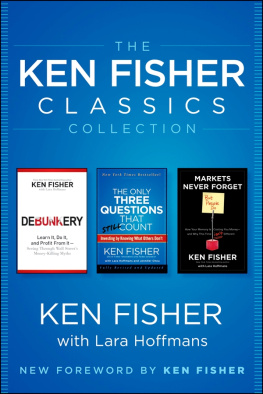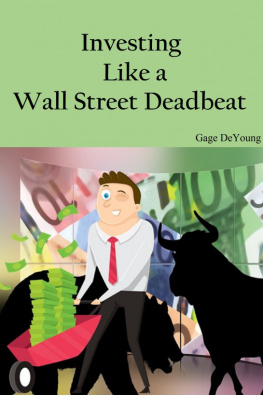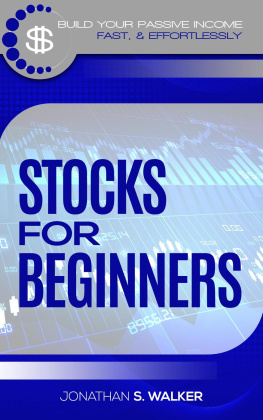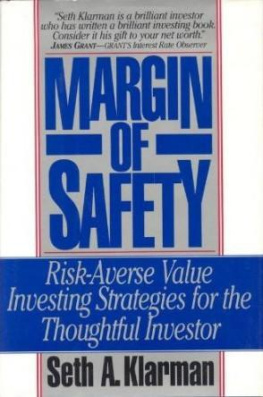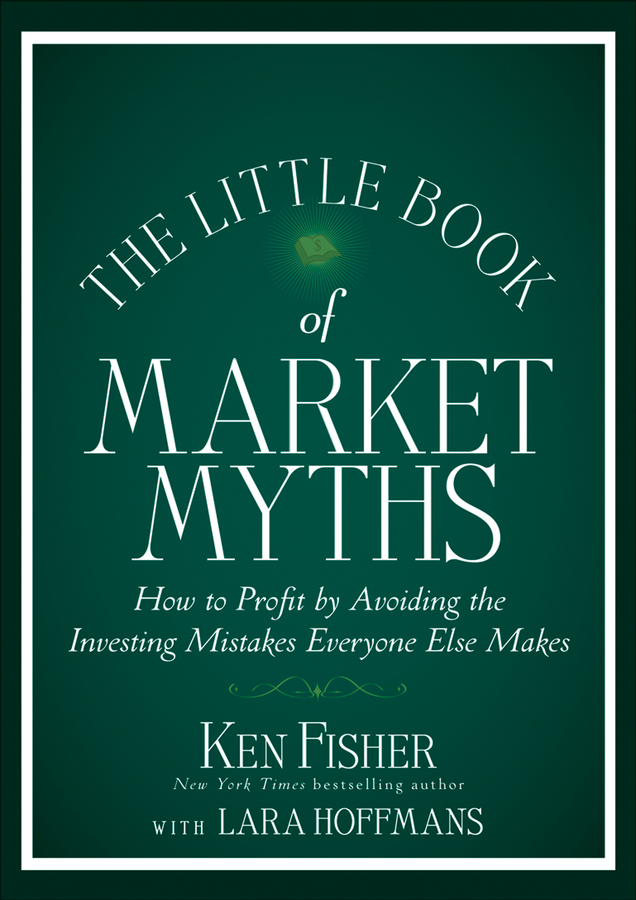Contents
Little Book Big Profits Series 
In the Little Book Big Profits series, the brightest icons in the financial world write on topics that range from tried-and-true investment strategies to tomorrows new trends. Each book offers a unique perspective on investing, allowing the reader to pick and choose from the very best in investment advice today.
Books in the Little Book Big Profits series include:
The Little Book That Still Beats the Market by Joel Greenblatt
The Little Book of Value Investing by Christopher Browne
The Little Book of Common Sense Investing by John C. Bogle
The Little Book That Makes You Rich by Louis Navellier
The Little Book That Builds Wealth by Pat Dorsey
The Little Book That Saves Your Assets by David M. Darst
The Little Book of Bull Moves by Peter D. Schiff
The Little Book of Main Street Money by Jonathan Clements
The Little Book of Safe Money by Jason Zweig
The Little Book of Behavioral Investing by James Montier
The Little Book of Big Dividends by Charles B. Carlson
The Little Book of Bulletproof Investing by Ben Stein and Phil DeMuth
The Little Book of Commodity Investing by John R. Stephenson
The Little Book of Economics by Greg Ip
The Little Book of Sideways Markets by Vitaliy N. Katsenelson
The Little Book of Currency Trading by Kathy Lien
The Little Book of Stock Market Profits by Mitch Zacks
The Little Book of Big Profits from Small Stocks by Hilary Kramer
The Little Book of Trading by Michael W. Covel
The Little Book of Alternative Investments by Ben Stein and Phil DeMuth
The Little Book of Valuation by Aswath Damodaran
The Little Book of Emerging Markets by Mark Mobius
The Little Book of Hedge Funds by Anthony Scaramucci
The Little Book of the Shrinking Dollar by Addison Wiggin
The Little Book of Bulls Eye Investing by John Mauldin
The Little Book of Market Myths by Ken Fisher and Lara Hoffmans

Cover Design: Paul McCarthy
Copyright 2013 by Fisher Investments. All rights reserved.
Published by John Wiley & Sons, Inc., Hoboken, New Jersey.
Published simultaneously in Canada.
No part of this publication may be reproduced, stored in a retrieval system, or transmitted in any form or by any means, electronic, mechanical, photocopying, recording, scanning, or otherwise, except as permitted under Section 107 or 108 of the 1976 United States Copyright Act, without either the prior written permission of the Publisher, or authorization through payment of the appropriate per-copy fee to the Copyright Clearance Center, Inc., 222 Rosewood Drive, Danvers, MA 01923, (978) 750-8400, fax (978) 646-8600, or on the Web at www.copyright.com . Requests to the Publisher for permission should be addressed to the Permissions Department, John Wiley & Sons, Inc., 111 River Street, Hoboken, NJ 07030, (201) 748-6011, fax (201) 748-6008, or online at http://www.wiley.com/go/permissions .
Important Disclaimers: This book reflects personal opinions, viewpoints and analyses of the authors and should not be regarded as a description of advisory services provided by Fisher Investments or performance returns of any Fisher Investments client. Fisher Investments manages its clients accounts using a variety of investment techniques and strategies not necessarily discussed in this book. Nothing in this book constitutes investment advice or any recommendation with respect to a particular country, sector, industry, security or portfolio of securities. All information is impersonal and not tailored to the circumstances or investment needs of any specific person.
Limit of Liability/Disclaimer of Warranty: While the publisher and author have used their best efforts in preparing this book, they make no representations or warranties with respect to the accuracy or completeness of the contents of this book and specifically disclaim any implied warranties of merchantability or fitness for a particular purpose. No warranty may be created or extended by sales representatives or written sales materials. The advice and strategies contained herein may not be suitable for your situation. You should consult with a professional where appropriate. Neither the publisher nor author shall be liable for any loss of profit or any other commercial damages, including but not limited to special, incidental, consequential, or other damages.
For general information on our other products and services or for technical support, please contact our Customer Care Department within the United States at (800) 762-2974, outside the United States at (317) 572-3993 or fax (317) 572-4002.
Wiley publishes in a variety of print and electronic formats and by print-on-demand. Some material included with standard print versions of this book may not be included in e-books or in print-on-demand. If this book refers to media such as a CD or DVD that is not included in the version you purchased, you may download this material at http://booksupport.wiley.com . For more information about Wiley products, visit www.wiley.com .
978-1-118-44501-3 (cloth); 978-1-118-44500-6 (ebk);
978-1-118-44498-6 (ebk); 978-1-118-44502-0 (ebk)
Preface
Questioning yourself is hard.
One of the hardest things we do (or rather, dont do). Folks dont like questioning themselves. If we question, we might discover were wrong, causing humiliation and pain. Humans evolved over many millennia to take any number of extraordinary and often irrational steps to avoid even the risk of humiliation and pain.
Those instincts likely helped our long-distant ancestors avoid being mauled by wild beasts and starving through long winters. But these deeply imprinted instincts often are exactly wrong when it comes to more modern problems like frequently counterintuitive capital markets.
I often say investing success is two-thirds avoiding mistakes, one-third doing something right. If you can just avoid mistakes, you can lower your error rate. That alone should improve your results. If you can avoid mistakes and do something right on occasion, you likely do better than most everyone. Better than most professionals!
Maybe you think avoiding mistakes is easy. Just dont make mistakes! Who sets out to make them, anyway? But investors dont make mistakes because they know theyre mistakes. They make them because they think theyre making smart decisions. Decisions theyve made plenty of times and have seen other smart people make. They think theyre the right decisions because they dont question.
After all, what sense does it make to question something that everyone knows? Or something thats common sense? Or something you learned from someone supposedly smarter than you?
Waste of time, right?
No! You should always question everything you think you know. Not once, but every time you make an investing decision. Its not hard. Well, functionally its not hard, though emotionally and instinctually, it might be. Whats the worst that can happen? You discover you were right all along, which is fun. No harm done. No humiliation!
Or... you discover you were wrong. And not just you, but the vast swaths of humanity who believe a false truthjust as you did! Youve uncovered a mythology. And discovering something you previously thought to be true is actually myth saves you from making a potentially costly mistake (or making it again). Thats not humiliating, thats beautiful. And potentially profitable.


